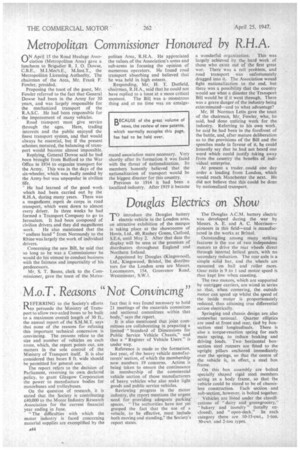Metropolitan Commissioner Honoured by R.H.A.
Page 54

If you've noticed an error in this article please click here to report it so we can fix it.
r-IN April 15 the Road Haulage Asso ciation (Metropolitan Area) gave a• luncheon to Brigadier R. J. O. Dowse, C.B.E., M.I.Mech.E., M.Inst.T., the Metropolitan Licensing Authority. The chairman of the Area, Mr. Frank F. Fowler, presided.
Proposing the toast of the guest, Mr. Fowler referred to the fact that Genera! Dowse had been in the Army for 30 years, and was largely responsible for the mechanized transport of the R.A.S.C. He had been responsible for the impressment of many vehicles.
Road transport must give service through the ages. Here, trading interests and the public enjoyed the finest transport system, and that would always be essential, but if the present schemes, matured, the balancing of transport would become almost impossible.
Replying, Genera! Dowse said he had been brought from Bulford to the War Office in 1934 to organize transport for the Army. This was in the days of the six-wheeler, which was badly needed by the Army but was unpopular in civilian life.
He had learned of the good work which had been carried out by the R.H.A. during many years. There was a magntficent esprit de corps in road transport, which went down to almost every driver. In three weeks he had formed a Transport Company to go to Jerusalem. It had been composed of civilian drivers and they did magnificent work. He also mentioned that the "endless band" from Normandy to the Rhine was largely the work of individual drivers.
Concerning the new Bill, he said that so long as he was a Commissioner he would do his utmost to conduct business with the fairness and impartiality of his predecessors.
Mr. S. T. Benns, clerk to the Commissioner, gave the toast of the Metro politan Area, R.H.A. He apPreciated the values of the Association's areas and sub-areas in focusing the opinion of numerous operators. He found road transport absorbing and believed that he was held in high esteem.
Responding, Mr. H. T. Duffield, chairman, R.H.A., said that he could not have replied to a toast at a more critical moment. The Bill was amonstrous thing and at no time was an amalga mated aasociation more necessary. Very shortly after its formation it was faced with the threat of nationalization. Its members honestly believed that the nationalization of transport would be the biggest disaster for this country. Previous to 1914 it had been a localized industry. After 1919 it became a wonderful organization. This was
largely achieved by. the hard work of those who came out of the first great war. There was a rail problem, and road transport was unfortunately dragged into it. The Association would fight nationalization to the end, but there was a possibility that the country would see what a disaster the Transport Bill would be if it went through. There was a grave danger of the industry being exterminated—and to what advantage?
Mr. H Norman Letts gave the toast of the chairman, Mr. Fowler, who, he said, had done nntiring work for the industry. Referring to his own work, he said he had been in the forefront of the battle, and, after mature deliberation as to the provisions of the Bill and the speeches made in favour of it, he could honestly say that he had not heard one word which could justify taking away from the country the benefits of individual enterprise.
At present a trader. could one day order a loading from London, which would reach Manchester the next. He did not believe that this could be done by nationalized transport.












































































